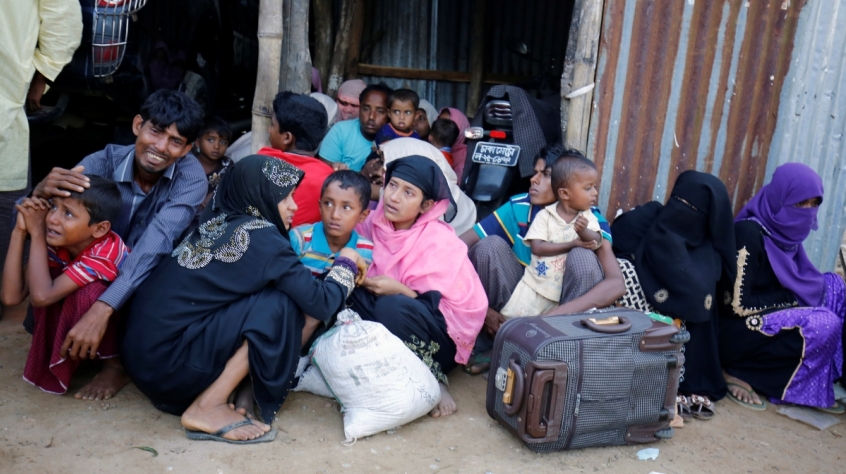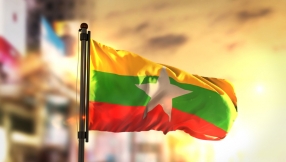
The tragedy unfolding on the Burma-Bangladesh border is described as the worst human rights crisis in Burma in recent years – and that is in a country that has endured some of the worst human rights violations in the world.
Every day the number of displaced Rohingyas goes up. The latest count is around 400,000. The death toll is unknown, but is almost certainly in the thousands. Hundreds of villages have been destroyed. Allegations of horrific atrocities – including beheadings and the killing of babies and children – turn what is already a tragedy into another Rwanda, Srebrenica, Kosovo or Darfur. The UN Secretary-General Antonio Guterres has described the crisis as 'catastrophic' and the UN High Commissioner for Human Rights Zeijd Ra'ad Al Hussein has said that it is "a textbook example of ethnic cleansing".
The question is, what should be done and by whom?
Much of the international attention has, understandably, rested on Burma's Nobel Peace Prize Laureate and democracy leader Aung San Suu Kyi, the de facto head of government. Yet while the criticism is understandable and some of it justified, she is not the person with the power to stop this crisis. Under the constitution drafted by the military in 2008, she has no control over the army at all – indeed, the three key government ministries directly relevant to this and other ethnic conflicts in Burma are controlled, constitutionally, by the military: defence, border affairs and home affairs. It is the Commander-in-Chief, Senior General Min Aung Hlaing, on whom international pressure should be focused. He alone has the power to order his soldiers to stop shooting, killing and burning.
Furthermore, Suu Kyi is in the unenviable position of having to calculate the risks for herself. Every day she remains silent – and indeed, actually defends the army as she has done on the few occasions she has spoken – her international reputation is eroded. But if she spoke out, she would put an already hostile army even more against her, potentially increasing the risk of a coup, and she could lose the support of her core constituency, the Burman Buddhist majority, where racial prejudice against the Rohingya is rampant. These are not excuses for her failure to stop ethnic cleansing, but they are part of the explanation.
What, then, could she do? As a political leader and a Nobel Laureate, she should not stand in the way of international assistance. She should do everything within her power to ensure that access for international humanitarian aid agencies, human rights investigators and journalists to all of Rakhine State is ensured and unhindered. And she should do everything possible to revive the recommendations of the Rakhine Advisory Commission which she established and which was chaired by former UN Secretary-General Kofi Annan. It was within a few hours of the release of their report that a small armed Rohingya group, the Arakan Rohingya Salvation Army (ARSA), attacked Burmese police posts in a deeply unwise and profoundly counter-productive act that precipitated the Burma Army's grossly disproportionate response and has led to the crisis we see today. Suu Kyi may be almost silent today, but one has to hope that she is working behind the scenes for a longer-term political solution that brings some justice for all concerned.
What can the international community do that it isn't?
Currently it seems there is some talk, but very little action. To its credit, the United Kingdom has triggered two UN Security Council discussions. But the first yielded no public result, and the second merely a statement – the weakest form on Security Council action. Britain and others must now work urgently for a Security Council resolution focused on the Burma Army's actions, with measures to penalize them for their crimes – at the very least a global arms embargo. A resolution at the UN General Assembly which begins next week should also be introduced.
Many countries won't do this, but the European Union, United States, Canada, Australia and others who have traditionally been sympathetic to human rights concerns should reimpose a visa ban on the military. Burma's Generals should not be given red carpet treatment around the world at a time when their hands are red with blood.
The United Kingdom should suspend its training programme with the Burma Army, as should others with similar programmes.
Humanitarian aid is urgently needed and Bangladesh cannot be expected to handle the hundreds of thousands of people that have poured across its border without international assistance.
And the Church? It is vital that as a Muslim minority faces ethnic cleansing and potentially genocide, Christians speak out in solidarity with them. Pope Francis has done so repeatedly, and others must join him. Burma's Cardinal Charles Bo has long been an outspoken voice for human rights and religious freedom in the country, and has recently repeated his calls for peace. In an interview with TIME magazine, he said he was 'shocked at the nationalistic feeling provoked and spread by handful of men with social media'. Pope Francis will visit Burma in November, and Cardinal Bo says he hopes that he will be able to address Burma's challenges 'in a way that brings healing not hatred'.
Yesterday I received a beautiful email message from a courageous nun in another country that has a history of profound suffering – East Timor. Sister Lourdes, who helped thousands of her own people displaced by conflict with the Indonesian army in the past, said: 'The news from Burma, God only knows what will happen. I am feeling very worried for these injustices, I can't handle it, it has been almost three nights I haven't slept, imagining so many deaths and cruelties. Well, my brother, God choose you to be His instrument. I know you are busy, but don't forget to find oxygen in Christ, in your silence and contemplation. I pray for you and all those who are suffering right now. I hope you and your good friends, men and women of God, will be the element to change this situation. God bless you, and free you from all the evil. We are with you, [we] pray for you.' A powerful reminder of the value of international solidarity, especially among the persecuted, and of the vitality of prayer. If you do nothing else for the Rohingyas and Burma, you can at least pray – and that is the most important thing you can do.
The horrors unfolding on Burma's western border are appalling. Add into the mix the fact that radical Islamist groups – including al-Qaeda – have threatened jihad in revenge and you have a lethal cocktail that threatens not only Burma's fragile democratization but the region as a whole. The plight of innocent Rohingya civilians has already been hijacked as a cause by radical Islamists. Only by addressing their very deep grievances and working towards a political solution that ensures justice and reconciliation can a further perpetual cycle of violence and hatred be prevented. The only two forces with an interest in further fueling this crisis are Burma's army and radical Islamists. For everyone else, action to stop it is long overdue.
Benedict Rogers is East Asia Team Leader at Christian Solidarity Worldwide, and the author of three books on Burma, including Burma: A Nation at the Crossroads. On Twitter @csw_uk @cswadvocacy @cswpress













